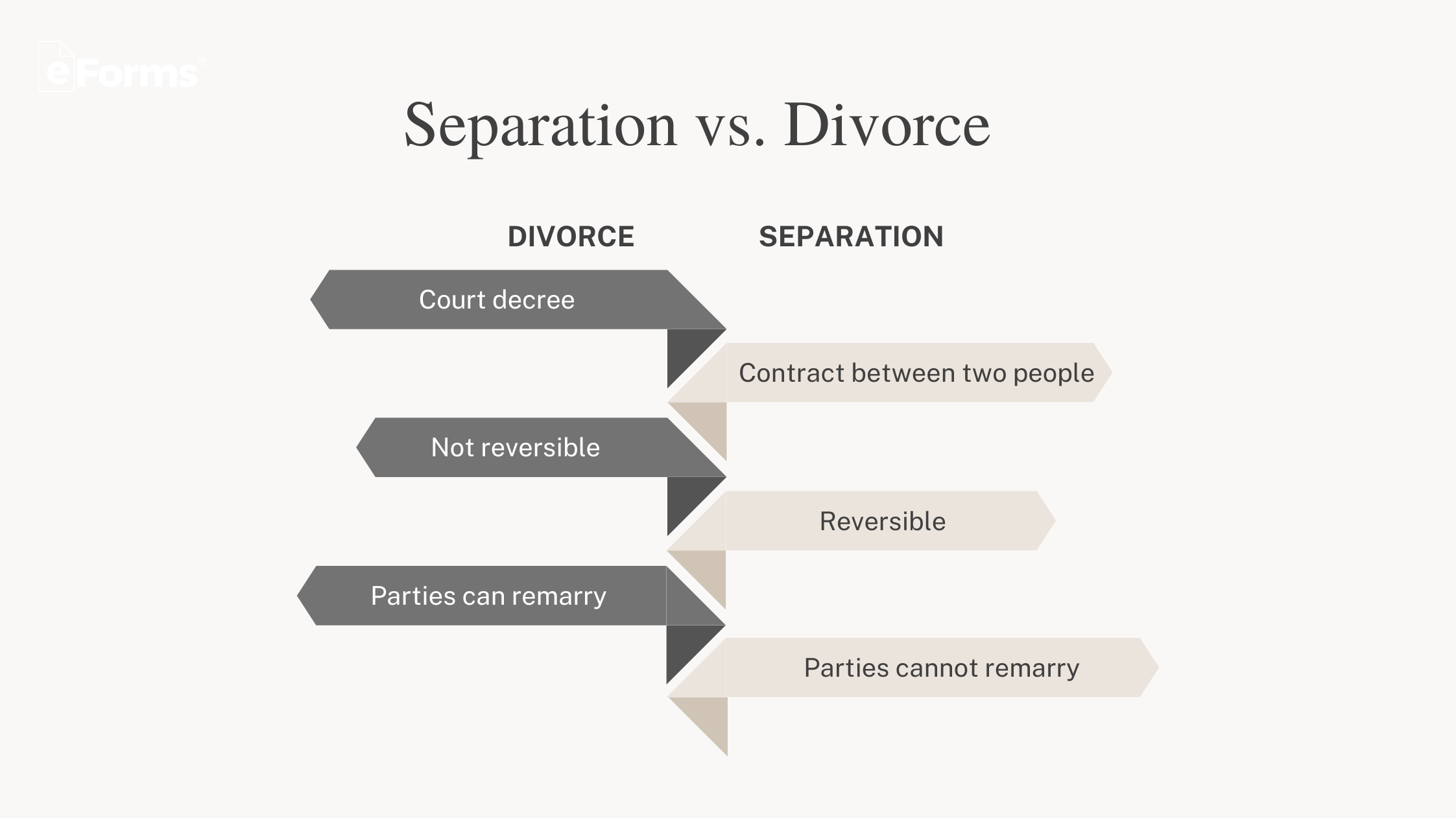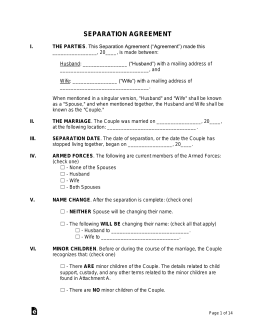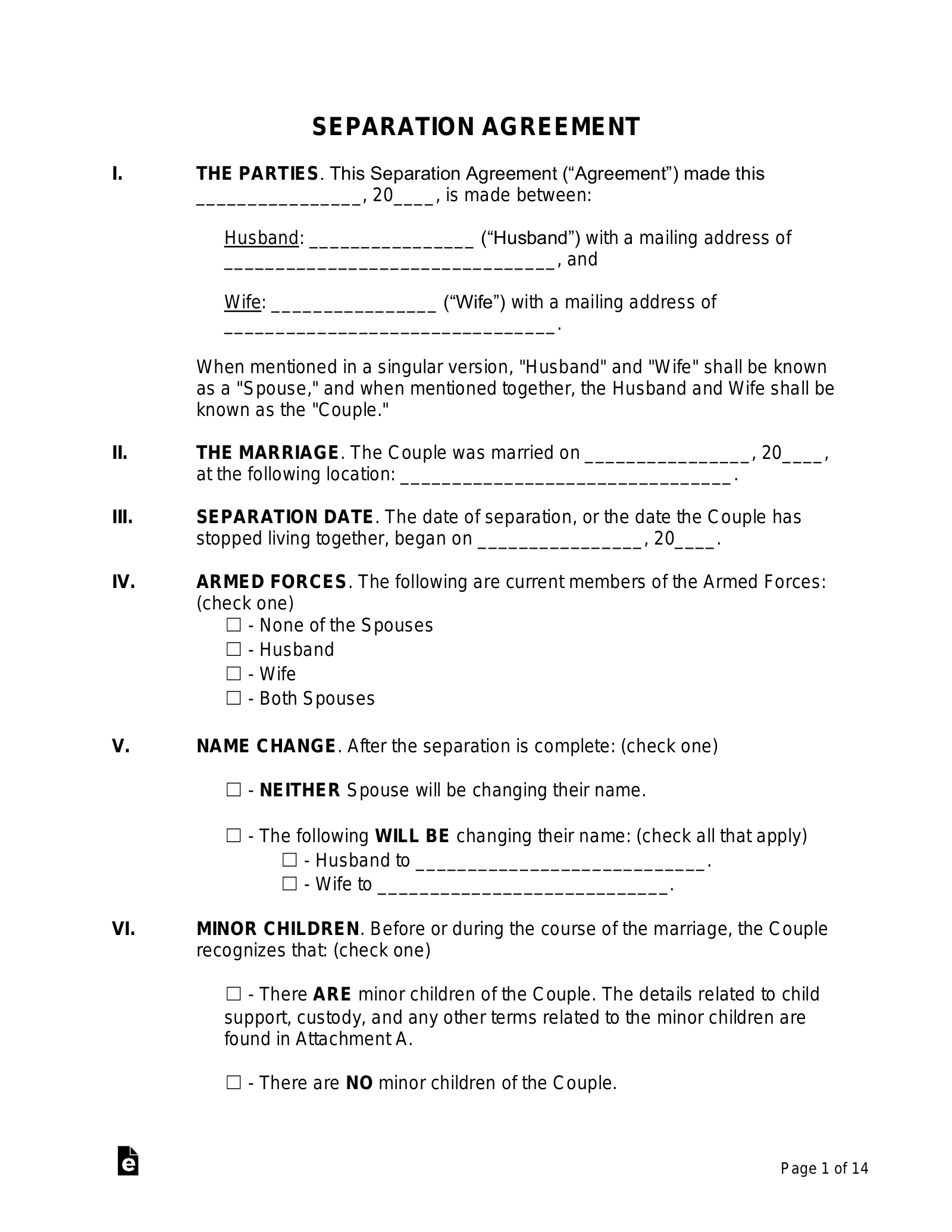Updated March 17, 2024
A marital separation agreement is a legal document that separates the assets and debts of a couple and establishes child support and custody if minor children are involved. It allows a couple to legally separate while leaving the door open to reconciling the marriage at a later time.
Is it Legally Binding?
Yes, a separation agreement is legally binding and will be used during court proceedings if a divorce is filed.
By State
- Alabama
- Alaska
- Arizona
- Arkansas
- California
- Colorado
- Connecticut
- Delaware
- Florida
- Georgia
- Hawaii
- Idaho
- Illinois
- Indiana
- Iowa
- Kansas
- Kentucky
- Louisiana
- Maine
- Maryland
- Massachusetts
- Michigan
- Minnesota
- Mississippi
- Missouri
- Montana
- Nebraska
- Nevada
- New Hampshire
- New Jersey
- New Mexico
- New York
- North Carolina
- North Dakota
- Ohio
- Oklahoma
- Oregon
- Pennsylvania
- Rhode Island
- South Carolina
- South Dakota
- Tennessee
- Texas
- Utah
- Vermont
- Virginia
- Washington
- Washington D.C.
- West Virginia
- Wisconsin
- Wyoming
What is a Separation Agreement?
A separation agreement is a contract created by a married couple that sets out rights and obligations for a period when the couple is separated, once they are divorced, or potentially both. The agreements can address:
- Assets – how assets are divided
- Spousal Support – the level of spousal support that is owed
- Custody – in some cases, child support and custody
However, terms in separation agreements related to children generally face greater scrutiny from courts.
Separation vs. Divorce

Like divorce, separation means that the parties no longer wish to live as spouses. Separation is a distinct legal status in most states. In those cases, the requirements to be separated are very similar to the requirements to be divorced.
The main difference is that separation is a contract between two (2) people, while divorce involves a court decree. This results in important legal distinctions:
- While separation agreements can be undone if the couple decides to live as spouses again, divorce cannot.
- Spousal benefits like health insurance may still apply to separated couples.
- Parties can legally remarry after a divorce but not in a separation.
- Separation agreements are enforced through civil courts, whereas divorce decrees are implemented through family court.
Do You Have to Be Married?
Yes. Because separation agreements are intended to have legal effects on property rights, they are specifically addressed toward people who are married. If neither spouse believes they are in a valid marriage, then a separation agreement is probably not an option to pursue.
However, there are instances in which people are not legally married, but may nonetheless have legal obligations toward one another: common law marriage and putative marriage. The law on these issues varies by state, and it may be possible to use a separation agreement in common law or putative marriage situations in states that recognize them.
What’s Included in a Separation Agreement?
The following is an overview of the kind of information that is important to include in a separation agreement. It is not necessarily a complete list.
1. Identifying information
This is the place where couples provide their names and contact information. If one spouse took another’s name after marriage but intends to change it back after separation, make a note of that.
2. Separation Date
The separation date is the date on which the parties consider themselves to no longer be living as a married couple. It does not have to be the date on which the agreement is signed, and indeed it probably will not be.
The separation date is a particularly important consideration in community property states, because assets acquired after the date of separation are generally considered separate property.
As a result, the separation date may in some cases have a big impact on rights to certain property. In order to address potential disputes about the separation date, parties should maintain records related to when the separation began.
3. Living Arrangements
Many couples choose to stop living at the same property following a separation (though some do not). The agreement can be an opportunity for the parties to formalize living arrangements during the period of separation.
For couples that have children, one strategy that is becoming increasingly common during separations is “birdnesting,” in which the child remains at the home while the parents take turns living elsewhere.
4. Child Support and Alimony
It is common for separation agreements to set out terms of spousal support, and child support if the couple has children. Couples have some flexibility in determining how much support is required. But in many states, spousal and child support are among the kind of terms that a court asked to enforce a separation agreement can modify or set aside if they are unfair.
To prevent this from happening, it can be helpful to look at how courts in the state determine support levels. There tends to be more flexibility with spousal support, although some states have a set of formulas couples can use to determine the level of spousal support, often called alimony. Child support is even more carefully monitored by courts.
Depending on the parties’ intent and future plans, a separation agreement may include costs that will only emerge much later, such as an obligation to pay for the university education of a child who is an infant at the time of the separation. For more on this, see Section 8 (Merger and Incorporation).
5. Rights Regarding Children
If the couple has children, the separation agreement should clarify what will happen to the children during the course of the separation. This is commonly known as “custody,” though some states use the term “legal decision-making” ability. Custody arrangements are also likely to be more closely scrutinized by a court than most terms in a separation agreement, so some research can be helpful to make sure the agreement is enforced.
Most states consider the “best interests of the child” in deciding on custody, and each state will have its own way of interpreting what this means. This is a complex area of law with few clear rules.
6. Division of Assets
Before preparing the separation agreement, it’s a good idea to create a list of all assets the couple owns and gather supporting documents, such as deeds or titles. Assets include personal property — physical objects, like vehicles or jewelry — and real property, meaning land. It can also include intangible assets, like stocks, bonds, or ownership interest in a company.
Along with identifying each asset and a determination of who it belongs to, this section can include:
- The asset’s value
- When the asset was acquired, and where the couple was living at the time
- For real property, its location
- For vehicles, identifying information like VIN or vessel numbers
Couples typically have a lot of flexibility in how to divide their assets. In the event there are disagreements about how the property will be divided, it can be helpful to understand how courts divide property in divorce or dissolution and use them as a backstop for negotiations.
Another factor that may influence the division of assets is a preexisting prenuptial agreement or postnuptial agreement. Prenups and postnups generally apply in case of the end of a marriage through divorce or death. However, whether the prenup or postnup applies will ultimately depend on the text of that agreement. It’s also possible for separation agreements to state that preexisting documents, such as a prenup or postnup, will control the division of assets.
7. Choice of Law
It is common for parties to a separation agreement to include a “choice of law” provision, which will determine under which state’s law the agreement will be interpreted. Couples with history, residences, or assets in several places should research the law in the states they are considering to see which one best meets their needs.
Courts are generally inclined to respect a couple’s selection on choice of law, but may set it aside if the couple cannot establish a legitimate connection to the chosen state or if the law in the chosen state conflicts with public policy in the state where the case is being held.
8. Merger and Incorporation
Even if the parties are not planning to get divorced immediately, it’s important to think about whether the separation agreement should be incorporated and merged with a future decree of divorce or dissolution. This decision can have a big impact on the future financial obligations of the parties.
- Incorporating a separation agreement generally makes it easier to enforce, although it also puts the agreement into the public record.
- If the agreement is incorporated and merged, legal significance is removed from the original agreement. A court is more likely to modify a merged agreement in response to changed circumstances, such as an illness or injury to one spouse that drastically changes the spouse’s finances.
- If the parties elect to incorporate but not merge the agreement, the original contract remains in effect. Unmerged agreements are usually followed by a court as written unless there is evidence of some underlying problem with the formation of the contract. This means provisions that are generally not enforceable in family court, like a promise to pay for a college education, can remain in effect.
Merger and incorporation is probably the most complex area of law associated with separation agreements, and there is not always clear guidance from statutes. Those with questions about how it could impact their situation should consider consulting with an attorney.
9. Reconciliation
At the opposite end of the spectrum from a divorce is the possibility of reconciliation. For couples that get back together, what becomes of the separation agreement? This is particularly important in the case of couples who create a separation agreement, reconcile, and then later separate again or get divorced.
Some states hold that reconciliation will typically make a separation agreement unenforceable, while others hold that it will do so only if that’s what the parties intend. No matter which state the agreement is being enforced in, however, it will be helpful to include the following information:
- What constitutes reconciliation: Parties should spell out what it means for them to have reconciled. Does it mean that they will resume living together? If so, for how long? Do other conditions need to be met?
- Effect of reconciliation: If the parties reconcile, does the separation agreement remain enforceable or is it void?
- Effect of subsequent separation or divorce:If the parties reconcile, then get separated again, is one party entitled to seek a modification of terms?
Why Make a Separation Agreement?

Before entering a separation agreement, spouses should have a thorough conversation with each other about where they expect the marriage to go. It’s also wise to consult with any financial professionals or advisors with whom they are currently working. This is especially true for couples that have complex assets, like patents or oil-and-gas leases.
Benefits
Like prenuptial agreements and divorce itself, separation agreements are now viewed much more favorably than they once were, and are broadly encouraged by courts. The primary benefits of a separation agreement are:
- Flexibility: Because separation agreements are contracts, the spouses can negotiate almost any terms they want. It also accommodates couples who know they need a break, but are unsure if they are ready to pursue a full-on divorce.
- Accountability: Separation agreements provide each spouse with the ability to guarantee that the other spouse keeps certain promises, or can seek remedies if the spouse fails.
- Speed: Pursuing a divorce can be time-consuming. Many states have mandatory waiting periods, in which a divorce cannot be finalized for a certain amount of time after filing. Divorce courts are also highly impacted, and it can take time to secure a court date.
Challenges
No legal process is without challenges. For separation agreements, they include:
- Cost: If the spouses in a couple are certain that they want to get divorced, have few assets, and live in a state that allows for simple divorces, pursuing a separation agreement may be an unnecessary expense. (However, in some states, a separation agreement is a prerequisite for a speedier divorce.)
- Impact on Other Legal Instruments: It’s possible that some benefits to which a person is entitled could be impacted by formalizing separation status. For example, it was once common for wills to contain bequests allowing a couple to use of property or other assets “so long as they live together as husband and wife.” While such a loss is not necessarily a reason to avoid separating, couples should be aware of possible costs before entering an agreement.
- Impact on Relationship: Couples should always be certain about the status of their relationship before rushing into a separation agreement. In states that recognize judicial separation, a separation agreement can be sought even if only one party wants to separate. (All states allow divorce even if only one party wants to get divorced.) But pursuing one without sufficient communication will likely make things worse.
How to Legally Separate (6 steps)
- Determine Whether the State Permits Judicial Separation
- Create a List of Assets
- If Applicable, Speak with Financial Advisors
- Offer the Chance to Consult with an Attorney
- Draft the Agreement
- If Desired and Able, File with the Court
1. Determine Whether the State Permits Judicial Separation

Six (6) states do not recognize judicial separation: Delaware, Florida, Georgia, Mississippi, Pennsylvania, and Texas.
In these states, couples are still free to form separation agreements just like any other contract. But, as is explained above, couples in these states will not be able to take advantage of a court’s contempt powers unless they seek a full divorce, which is helpful to understand ahead of time.
3. If Applicable, Speak with Financial Advisors

In some cases, the way assets are divided can impact their value, and so speaking with financial professionals is beneficial. For example, if a couple’s assets include a controlling stake in a closely held corporation, splitting the assets evenly would mean that neither side gets a controlling stake, and would make each spouse’s share worth much less than half of the total.
6. If Desired and Able, File with the Court

As discussed in the note regarding “Merger and Incorporation,” even in a state that does recognize judicial separation, it is not always necessary to file the agreement with the court; separation agreements are potentially enforceable even if not filed. However, filing may make them easier to enforce.
What Invalidates a Separation Agreement?
Separation agreements can be invalidated for essentially the same reasons that most contracts are.
Duress: This occurs when both parties appear to have joined in the separation agreement, but when one party did so involuntarily because the other party made it so that there was no other choice. Although the meaning of duress will vary from state to state, one example that may invalidate a contract is threatening that a spouse will lose the ability to see the couple’s children unless the agreement is signed.
Unconscionability: Unconscionability means that an agreement is grossly unfair to one side. Although couples are able to negotiate an agreement that for some reason gives more assets to one spouse than the other, most states allow courts to invalidate separation agreements if they are excessively one-sided.
Violates Public Policy: Separation agreements that violate public policy are typically void. It was once common for courts to invalidate divorce, prenuptial agreements and other family law actions because they clashed with dominant conceptions of family structure and gender roles. While this has largely stopped, states remain unwilling to enforce contracts that would regulate deeply personal conduct, such as a separation agreement that attempts to prohibit one spouse from dating.
What Are the Consequences of Violating a Separation Agreement?
In most instances, the spouse who violates a separation agreement will be obligated to pay monetary damages. This can typically be thought of as the difference in value between what the spouse promised to do under the agreement and what the spouse did that resulted in violating the agreement. For example, if Spouse A had promised to pay Spouse B $2,000 a month in spousal support, but one month only pays $500, Spouse B’s damages would be $1500.
But because separation agreements are contracts, couples can specify what one spouse is entitled to when the other violates a provision of the agreement. In some cases, an agreement can specify the amount of money a person who violates a particular term must pay. However, if the amount is so high that it has no relation to the harm the spouse suffered, then it probably will not be enforced.
In an instance where monetary damages are hard to calculate or not appropriate, couples may receive a court order to obligate the other spouse to follow the agreement. This may be easier if the agreement is filed with a court.
FAQs (Frequently Asked Questions)
What if the Couple Has Children?
Couples with children are allowed to create separation agreements and set out terms related to the children, such as child support or custody, in the agreement. However, courts in states with judicial separation are much more likely to modify these terms than others. And in states without judicial separation, couples may need to go through the entire divorce process to have these terms enforced.
What Happens if One Party Dies?
While the consequences of one spouse dying on a separation agreement will depend on the state where the agreement is being enforced. But most states hold that a spouse’s obligation to pay spousal support under an agreement ends when the spouse dies unless the agreement shows a clear intent for payments to continue to be drawn from the deceased spouse’s estate.
Additionally, if two spouses create a separation agreement, and then one spouse dies intestate (meaning without a will), the surviving spouse may not be entitled to a share of the estate that would normally follow through intestate succession rules.
Can the Agreement Be Changed?
Yes. Separation agreements are contracts and can be modified with the agreement of both parties. However, certain terms, like those involving child support or custody, may not be easily modified.
How is it Enforced?
The way a separation agreement is enforced depends on the state.
In a state that does not recognize judicial separation, a spouse could sue in civil court to have the agreement enforced as a contract. But any term other than those related to the division of assets may not be enforceable, and a couple would need to seek a divorce to enforce their wishes regarding child custody.
In states that do recognize judicial separation, enforcement can happen either through a civil court or, if a petition has been filed with the court, through a family court. Enforcement through family court may be more efficient because the agreement can be enforced through the court’s contempt powers, which include the threat of arrest for violating an order.
Should We Sell Our House?
A home is likely to be one of the more challenging assets to divide in making a separation agreement. For most couples, the home will be the most valuable thing they own, and unlike money in a bank account or shares of stock, it cannot be easily divided.
Unfortunately, there is no easy answer about whether to sell a home when creating a separation agreement. There are many factors to consider in deciding whether to sell a house ahead of a separation agreement, including:
- Living Arrangements: How is the couple going to live when separated? Is it possible, or desirable, for one or both spouses to leave the area? And how would selling a home impact any children in the marriage?
- Availability of other assets: In many marriages, a home may be more valuable than the couple’s other assets. In these cases, creating an equitable agreement without selling the home would be challenging.
- The market: Are home prices likely to increase in the near future? If so, selling the home immediately could be wasteful.
- Alternatives: In the event the couple cannot agree on who should get the house but are in need of money, is it possible to rent the home or seek some other source of revenue without selling it?
Couples struggling over whether to sell a home when creating a separation agreement should consider speaking with a financial advisor or real estate agent.
Do Separation Agreements Have to Be Notarized?
The drafting requirements of separation agreements vary by state, but in general, contracts do not need to be notarized. However, some states do impose requirements that separation agreements that have certain types of clauses, such as those affecting real estate, must be notarized. And in general, having the agreement notarized, or witnessed by a court official, will make it less likely that questions arise about its enforceability.
Do Separation Agreements Have to Be Filed?
In states that do not recognize judicial separation, separation agreements cannot be filed.
In states that do recognize judicial separation, agreements do not necessarily need to be filed. But doing so can make the agreement easier to enforce if one party violates it, and can also allow the agreement to be more readily modified if circumstances change.
What Happens if Parties Divorce?
The impact of divorce on a separation agreement depends on whether the parties intend for the separation agreement to be incorporated and merged into the divorce decree, incorporated, or none of the above. For a fuller explanation, see the “Merger and Incorporation” section.
Are Separation Agreements Public Record?
If a separation agreement is filed with a court, then it generally becomes a public record. If there are abuse concerns in the relationship, it may be possible for some of the agreement to be shielded.





